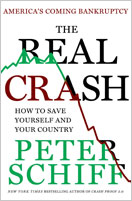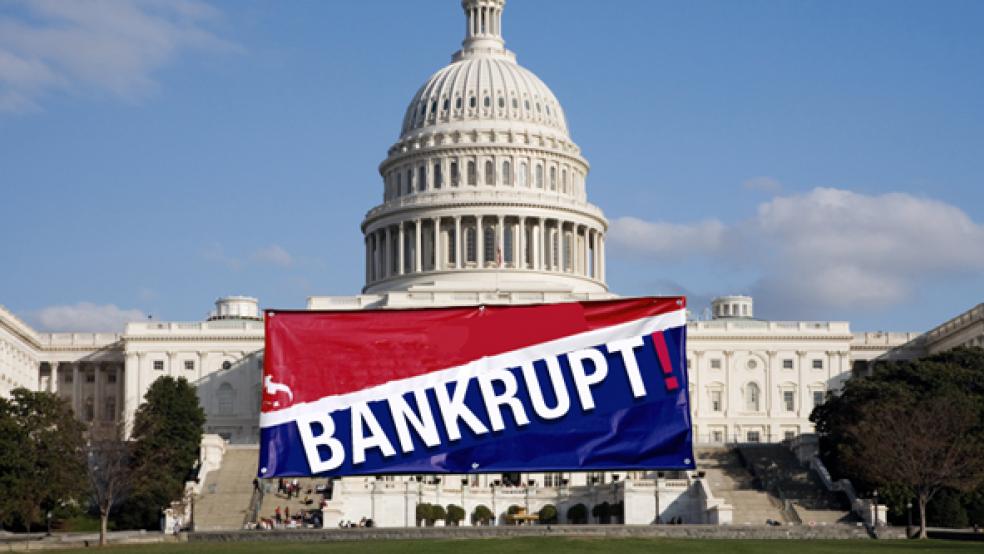If the U.S. government were a private company being audited by standard practices, it would be considered much further in the red than official national debt figures show. It would, in fact, be shut down and its key executive prosecuted for fraud.
The national debt is $15 trillion. Let me try to put that huge number in perspective.
All federal tax revenue in 2011 was $2.2 trillion — less than one sixth of the total national debt. The $15 trillion debt amounts to $133,000 per taxpayer. The richest person in America, Bill Gates, has a total net worth of $59 billion. If he donated every dime to the U.S. Treasury in order to pay down the national debt, he couldn’t even retire one half of one percent of the debt. Put another way, he could pay two months’ of interest.
In fiscal year 2011, taxpayers paid $454 billion in interest. That’s 20 percent of all federal receipts. It’s more than twice as much as Washington collected through the corporate income tax.
But the $15 trillion actually represents the tip of a very large iceberg. When off-budget and contingent liabilities are factored in, total federal liabilities exceed $100 trillion. Nobody knows the future obligations of our entitlement programs. It is also clear that more financial bailouts are coming. Fannie Mae asks for a new multibillion-dollar bailout every few months. Soon the FHA will climb aboard the bailout bandwagon. There’s also the U.S. Post Office, for which a taxpayer bailout is all but assured. And Amtrak, which probably has another bailout coming as well – along with state governments, including their public pensions.
RELATED: National Debt: America's Declaration of Dependence
Since the FDIC will lack the resources to cover the insured deposits of the big banks, that’s yet another bailout waiting in the wings. Then there’s the Securities Investor Protection Corporation (SIPC), which insures individual brokerage accounts of up to $500,000 in value. The Pension Benefit Guarantee Program (PBGP) puts federal guarantees behind billions of dollars of defined benefit pension programs. In a downturn as severe as the one I see coming, both these agencies will require bailouts as well. And who knows what the next Detroit-type bailout will be, or Katrina-level national disaster?
The biggest problem underlying the U.S. economy is artificially low interest rates,
due to Fed manipulation. It’s the root cause of the macro economic
imbalances crippling us. Until rates rise to reflect a true market price,
a real economic recovery cannot take place.
Still, Uncle Sam is able to borrow at near-zero interest rates. This makes it nearly affordable for us to pay what we owe. The disturbing news is that interest rates will rise. And when we have a national debt seven times our annual tax receipts and interest rates start doubling and tripling, things will get ugly. At some point, the charade will be up – and we’ll have to admit we’re broke.
In short: America is bankrupt. It’s time to admit it.
INTEREST RATES AND PAYING OUR CREDITORS
The biggest problem underlying the U.S. economy is artificially low interest rates, due to Fed manipulation. It’s the root cause of the macro economic imbalances that are crippling us. Until rates are allowed to rise to reflect a true market price, a real economic recovery cannot take place. These artificially low rates don’t finance anything useful, and they actually crowd out real savings, thus preventing Americans from ever getting to the point wehre they can afford to spend. So the national debt will keep rising.

Yet America simply cannot pay its bills much longer. Our government has promised too many people too many things. We can try to skim “wasteful spending,” and hike taxes on the rich all we like, but soon we’ll have to admit that something’s got to give. We can’t meet our obligations. Somebody’s going to get shortchanged.
America will soon be in the position that Greece is, with its “austerity” plans of tax hikes and benefit cuts. And I do not expect Americans to take austerity measures (designed to benefit the Chinese) any better than the Greeks have been taking theirs.
When a person has debts he cannot repay, he declares bankruptcy. He then formulates a plan for repaying his creditors to the greatest extent possible. It’s time for the United States of America to declare bankruptcy.
Since our creditors are going to take huge losses, what form will those losses take? Either our creditors will not get all of their money back, or the money they get back will buy much less than they expect. Either we default, or we allow inflation, but honest repayment isn’t an option. Given a choice between the two, default is by far the better choice, even for our creditors.
RELATED: Angry Voters to Obama: Stop the Ticking Debt Bomb
Will we default to avoid a crisis or in reaction to one? Will we default on our own terms or on those imposed upon us by our creditors? I would argue the sooner we default the better, and that the terms will be more favorable when we are the ones proposing them. None of these are easy questions. But we can’t start having an intelligent conversation if we keep pretending we can meet our obligations.
WHAT THE PUNDITS WILL SAY
I know exactly how the economic pundits will react to all this. Peter Schiff is saying we should default! This is the height of irresponsibility! How dare he even utter such words!
We saw similar hysterics around the 2011 debt-ceiling debate. The one thing on which all leaders in both parties agreed was that default was not acceptable. Both sides, in fact, attacked the other by saying the other guy was “willing to default rather than cut spending,” or, “willing to default rather than let tax cuts expire for the rich.”
Default was the only taboo. But what do we do when our taboo is inevitable?
In fact, by putting the default option on the table, we let creditors know just how low they actually sit on the repayment totem pole. From their perspective, this should have been an official admission we were running the world’s biggest Ponzi scheme. We put our creditors on notice that default was inevitable. Our leaders could have taken default off the table by stating we would prioritize payments on our debt over all other government expenditures. They did not do that.
RELATED: Boehner to Dems: We Won't Blink First on Debt Deal
Remember, the debt ceiling is self-imposed. Failing to raise it merely amounts to our own refusal to borrow. However, what happens when we hit the “lending ceiling”? That is a ceiling we cannot breach, as we lack the ability to lift it. Our creditors already know the answer: If they refuse to lend us more money, we will refuse to pay them back the money we have already borrowed!
If we declared bankruptcy today, while our outstanding debt is “only” $15 trillion or $16 trillion, our creditors we would be better off than if we waited until the debt hit $20 or $25 trillion. The truth is that inflation is worse than restructuring. The collateral damage to our economy, and real losses to our creditors, will be far greater if we inflate.
The Democrats talk as if our debt would go away if only we let the Bush tax cuts expire, sending the top rates up a few percentage points. But if you wanted to balance our budget by squeezing the rich, you would need to tax almost all of their income, at which point you would see their taxable incomes shrinking. If you hiked everyone’s taxes significantly, you could balance the budget, but you’d have to increase everyone’s taxes a lot.
The Republicans talk about a balanced budget amendment. But they know this is a harmless way to win points. It takes 67 votes in the Senate and 290 votes in the House in order to propose a constitutional amendment. After that, 38 states would need to ratify it. With that high a threshold, Republican lawmakers are free to posture and rail without a serious threat of ever being bound to a balanced budget.
What about our credit rating and our ability to borrow in the future? Sure, a default would make it harder for us to borrow cheaply. Our future borrowing costs will go up, but anything that prevents the U.S. government from borrowing money is a good thing.
If our government were run properly, Uncle Sam would just borrow for the short term to cover emergencies. And after we had rebuilt a government limited in its scope, and disciplined in its spending, lenders would see us as a safer bet than we are now.
Peter David Schiff is an investment broker, author, financial commentator and was a candidate for the Senate seat from Connecticut in the 2010 Republican primary. This excerpt is from his new book, The Real Crash: How to Save Yourself and Your Country . Used by permission of St. Martin’s Press.





